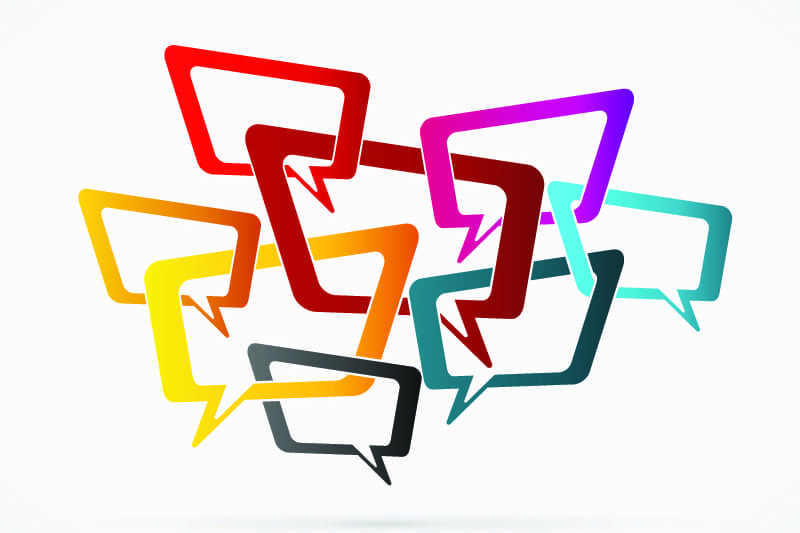I co-ran some training recently, on deep listening and communication skills. We talked about a wide variety of things, but the one thing that we got most feedback on was about monologues and dialogues in communication, as it was something that people hadn’t thought about before, but realised it was so very true.
A monologue is, essentially, a communication with oneself.
A dialogue is a communication between two people.
That sounds simple, right?
Many, many interactions that people have actually involve a series of short monologues that often alternate, to sound like a conversation.
These are times when the person is speaking, but not really connecting with the person they are speaking too; maybe not needing or wanting input, maybe talking to someone who isn’t able to engage with the conversation for some reason, or something else. If the other person does the same thing, then you have a series of sentences that sound like a conversation, but are actually a series of monologues. It’s almost like the person ‘listening’ loses the quality of being a human being and becomes a resource for the person talking. If the listener needs to talk too, then oftentimes, s/he does the same thing, in the same conversation. Both people lose the feeling of being a human being, and just become an ‘it’ to the other person. Some places describe monologues in conversation as ‘I-It’.
It might sound a bit like
Person 1- ‘I got stuck in traffic today’
Person 2- ‘So did I. I saw a car do something really stupid, it reversed down the slip road on, to avoid all the traffic’.
Person 1- ‘The other day a car pulled right in front of me and then slammed its brakes on. It scared me’.
Person 2- ‘I’ve seen that happen a lot near the Orwell Bridge, I guess probably because of the speed limits and speed cameras’.
As you can see, the topic of the interaction has a theme, but neither person is really interacting with the other, nor hearing, acknowledging or validating anything the other person says. If one imagines a ball indicating the dynamics of this conversation, it’s a bit like each person snatching the ball from the other.
When a dialogue is happening, it’s more natural and flows freely. It’s more like the ball is bouncing, very naturally, backward and forward between the two (or more) people in the conversation. Dialogue allows proper connection to people, and is about valuing both people within the conversation. It’s where both people are on the same page. It can also work with different dynamics because, despite it being a dialogue, in somewhere like the therapy room, the client generally talks much more, and this would also be a dialogue, as the therapist and client are on the same page and both engaged with the conversation. In a dialogue, both people are joining in with the conversation and connected to each other. Some places have described this kind of interaction as ‘I-Thou’, as the person talking is seeing the other person as a human being.
A dialogue may appear more like
Person 1- ‘I got stuck in traffic today’
Person 2- ‘Oh gosh, was that on the A14?’
Person 1- ‘Yeh, it was crazy… an accident, apparently. Did it affect you journey?’
Person 2- ‘No, thankfully not, but I thought it might, like it did last time although it definitely affected other people and how they drive… saw some stupid drivers’
Person 1- ‘it’s quite scary and frustrating, isn’t it, when you see people doing stupid things?’
And the conversation can go from there. Still the same theme, but both are connecting more with the other. I wonder if you can feel the difference in those two interactions as you read them. How different do they feel for you?
Why is this all so important? Having connections and interactions with other people is vital for our wellbeing. As human beings, we all need that, we all need to be heard, we all need to communicate and we all need that interaction. Monologues are so very common, but are deeply dissastisfying for both parties. Dialogues are less common, but both people will leave that conversation feeling connected, heard and valued as a person.
Maybe have a think about your interactions and the people you interact with.
Are they monologues or dialogues?
How do you feel when you leave the conversation?
Do you feel heard? Valued?
Do you feel frustrated? Ignored? Not heard?
You’ll be able to work out if a conversation is a dialogue or monologue from how you feel when you leave it.
If you leave feeling dissastisfied with the conversation, what needed to happen for you to feel heard in that conversation? What could you have done differently? What could someone else have done differently?
Looking back at our interactions can be useful and we can learn from them and learn how to get our needs met better. Have a think about yours.




